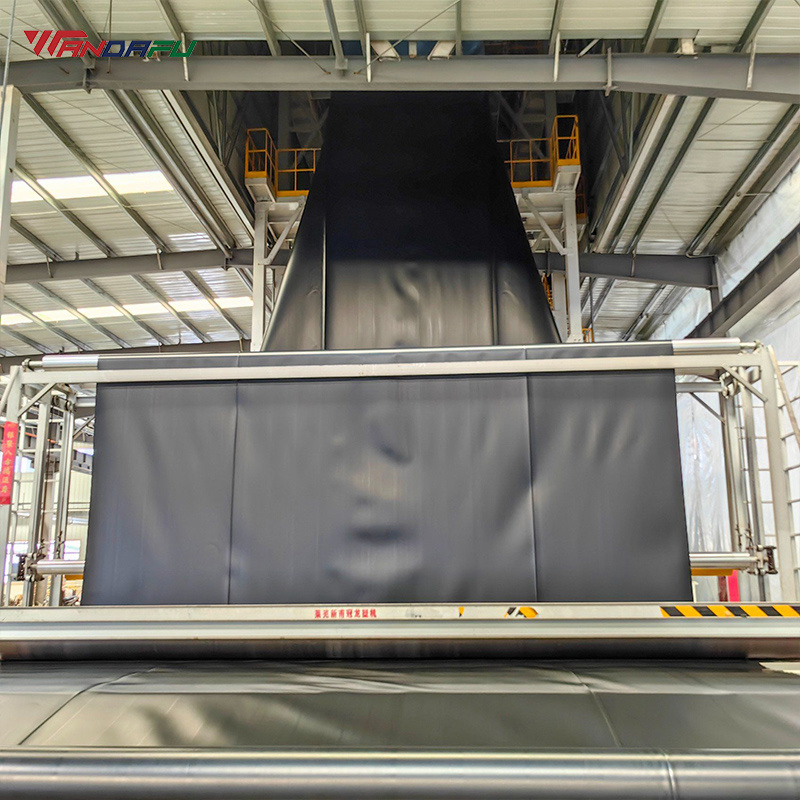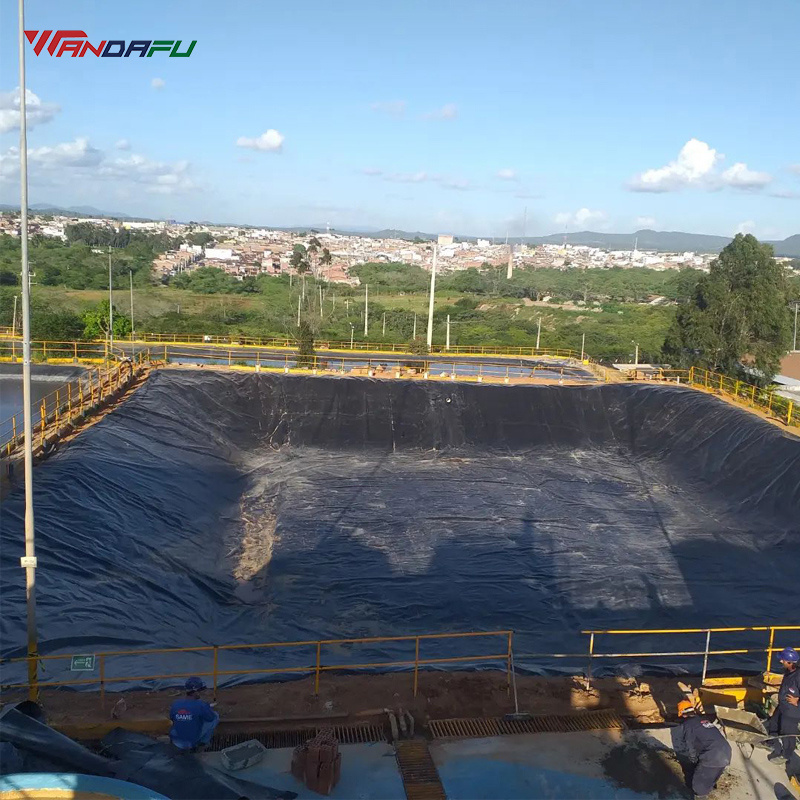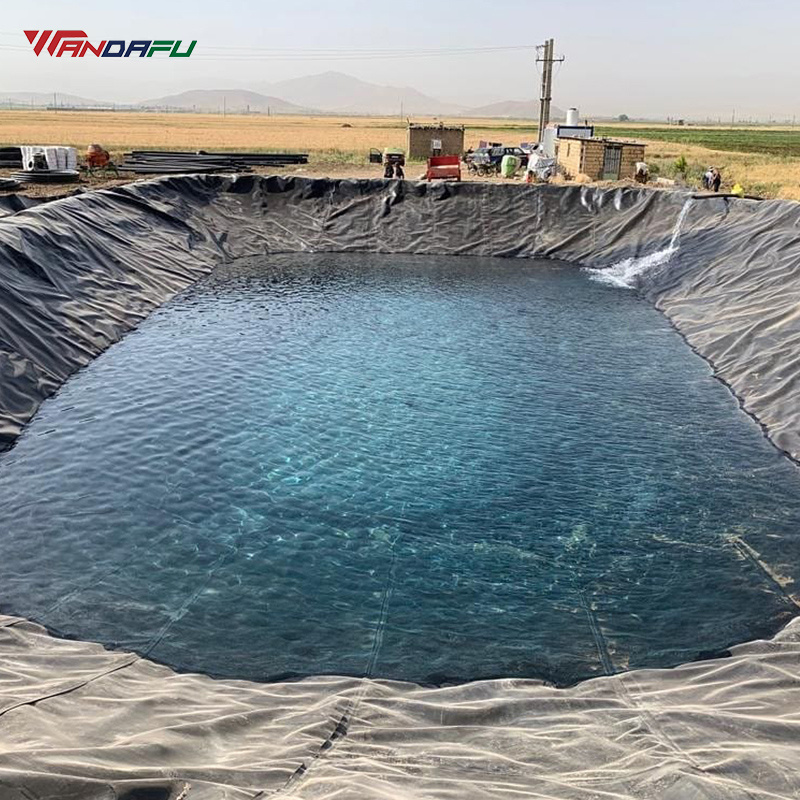
HDPE vs PVC Geomembrane: Which is Best for Your Project?
Release time:
2025-04-04
When selecting a geomembrane for your construction or environmental project, the choice between HDPE (High-Density Polyethylene) and PVC (Polyvinyl Chloride) is critical. Each material offers unique advantages depending on your project's requirements for strength, flexibility, chemical resistance, lifespan, and budget. At WDF Geosynthetics, with our 20+ years of field experience across six continents, we've developed this comprehensive technical guide to empower your material selection process. This isn't just a surface-level comparison - we'll dive deep into molecular structures, real-world performance data, installation best practices, and total cost analysis that you won't find in generic product brochures.This comprehensive guide compares HDPE and PVC geomembranes across all key performance factors, helping engineers, contractors, and project managers make the optimal material selection.
Introduction: Choosing the Right Geomembrane for Your Project
When selecting a geomembrane for your construction or environmental project, the choice between HDPE (High-Density Polyethylene) and PVC (Polyvinyl Chloride) is critical. Each material offers unique advantages depending on your project's requirements for strength, flexibility, chemical resistance, lifespan, and budget.
At WDF Geosynthetics, with our 20+ years of field experience across six continents, we've developed this comprehensive technical guide to empower your material selection process. This isn't just a surface-level comparison - we'll dive deep into molecular structures, real-world performance data, installation best practices, and total cost analysis that you won't find in generic product brochures.This comprehensive guide compares HDPE and PVC geomembranes across all key performance factors, helping engineers, contractors, and project managers make the optimal material selection.

Key Similarities Between HDPE and PVC Geomembranes
Before examining their differences, it's important to recognize what makes both HDPE and PVC geomembranes valuable containment solutions:
-
Excellent Impermeability: Both materials provide superior fluid barrier properties, preventing leakage in applications ranging from waste containment to water storage.
-
Chemical Resistance: HDPE and PVC geomembranes demonstrate resistance to many chemicals, making them suitable for industrial applications.
-
Customizable Specifications: Manufacturers can produce both types in various thicknesses and grades to meet specific project requirements.
-
Durability Features: Each offers puncture resistance and UV protection for long-term performance in exposed applications.
-
Installation Methods: Similar welding and seaming techniques can be used for both, though with different equipment and parameters.
1. Material Properties: HDPE vs PVC at a Glance
HDPE Geomembrane Characteristics
-
Composition: High-density polyethylene polymer
-
Key Strengths:
-
Superior tensile strength (21-34 MPa)
-
Excellent chemical resistance
-
Outstanding UV stability
-
Long service life (30+ years)
-
-
Limitations:
-
Lower flexibility at cold temperatures
-
Requires professional welding
-
PVC Geomembrane Characteristics
-
Composition: Polyvinyl chloride with plasticizers
-
Key Strengths:
-
High flexibility (even at low temperatures)
-
Easier installation methods
-
Lower initial cost
-
-
Limitations:
-
Moderate chemical resistance
-
Potential plasticizer migration
-
Shorter lifespan (10-15 years)
-
2. Performance Comparison: Critical Factors
| Property | HDPE Geomembrane | PVC Geomembrane |
|---|---|---|
| Tensile Strength | 21-34 MPa | 14-21 MPa |
| Puncture Resistance | Excellent | Good |
| Chemical Resistance | Exceptional | Moderate |
| UV Stability | Excellent | Fair (requires UV stabilizers) |
| Operating Temp Range | -60°C to +80°C | -40°C to +60°C |
| Flexibility | Stiff | Very Flexible |
| Lifespan | 30+ years | 10-15 years |
Application-Specific Recommendations
Best Uses for HDPE Geomembranes:
-
Landfill Liners and Caps: Where chemical resistance and long-term durability are critical
-
Mining Operations: For heap leach pads and tailings ponds requiring hydrocarbon resistance
-
Potable Water Storage: Thanks to its non-toxic composition
-
Aquaculture Ponds: Where long-term performance in harsh conditions is needed
-
Solar Evaporation Ponds: For brine containment in solar salt operations
-
Oil and Gas Applications: Including secondary containment and brine pits
Best Uses for PVC Geomembranes:
-
Decorative Ponds and Water Features: Where flexibility aids installation
-
Tunnel Waterproofing: Conforms well to complex shapes
-
Temporary Containment: Short-to-medium term projects
-
Roofing Membranes: Where flexibility is advantageous
-
Irrigation Canals: Easier installation on uneven surfaces
-
Below-Grade Construction: For foundation waterproofing
Making the Right Choice for Your Project
When selecting between HDPE and PVC geomembranes, consider these key factors:
-
Project Duration: Long-term projects favor HDPE; temporary applications may use PVC
-
Chemical Exposure: HDPE for harsh chemicals; PVC for moderate conditions
-
Temperature Extremes: HDPE performs better in both hot and cold climates
-
Environmental Sensitivity: HDPE for eco-sensitive areas
-
Substrate Conditions: PVC for irregular surfaces; HDPE for flat areas
-
Budget Constraints: PVC has lower upfront costs but may cost more long-term
-
Installation Complexity: PVC is easier for complex geometries
WDF Geomembrane Solutions
As a leading geomembrane manufacturer with over 20 years of experience, WDF offers premium HDPE geomembrane solutions for demanding applications. Our products include:
-
Smooth and textured HDPE liners in various colors (black, white, green, blue)
-
Custom thicknesses from 0.3mm to 3.0mm
-
OEM/ODM services for project-specific requirements
-
Advanced formulation for enhanced UV and chemical resistance
For projects where PVC may be more appropriate, we can provide expert guidance on specification and sourcing.


4. Installation & Cost Considerations
HDPE Installation
-
Method: Dual-track thermal fusion welding
-
Equipment: Specialized welding machines
-
Labor: Requires certified welders
-
Cost: Higher initial investment (but better ROI long-term)
PVC Installation
-
Method: Hot air welding or adhesive bonding
-
Equipment: Basic welding tools
-
Labor: Easier to train workers
-
Cost: Lower upfront costs
Cost Comparison Table
| Factor | HDPE | PVC |
|---|---|---|
| Material Cost | $$$ | $$ |
| Installation Cost | $$$ | $$ |
| Long-term Value | ★★★★★ | ★★★☆☆ |
5. Environmental & Safety Factors
HDPE Environmental Profile
-
Recyclable: Can be reprocessed at end-of-life
-
Non-toxic: No plasticizers or heavy metals
-
Sustainable: Lower carbon footprint than PVC
PVC Environmental Concerns
-
Plasticizers: May contain phthalates
-
Recycling Challenges: Limited recycling infrastructure
-
Production Impacts: Chlorine-based manufacturing
6. Technical Specifications Comparison
| Parameter | HDPE | PVC |
|---|---|---|
| Thickness Range | 0.5-3.0 mm | 0.5-2.0 mm |
| Density | 0.94-0.96 g/cm³ | 1.2-1.4 g/cm³ |
| Melt Flow Index | 0.1-0.4 g/10min | N/A |
| Water Vapor Transmission | <0.1 g/m²/day | 0.5-2.0 g/m²/day |
7. Industry-Leading Solutions from WDF Geosynthetics
As a premier geomembrane manufacturer, BPM Geosynthetics offers:
-
Custom HDPE Formulations: Smooth, textured, and composite options
-
PVC Alternatives: More environmentally friendly options
-
Value-Added Services:
-
Free project consultations
-
Installation training programs
-
Custom fabrication services
-
Quality certifications (GRI-GM13, NSF-61)
-
Request a Free Sample → [Contact WDF Geosynthetics]
8. Decision Guide: HDPE or PVC?
Choose HDPE When You Need:
✓ Maximum durability and lifespan
✓ Superior chemical resistance
✓ Heavy-duty applications
✓ Long-term cost savings
Choose PVC When You Need:
✓ Lower initial investment
✓ Complex shape conformity
✓ Cold weather flexibility
✓ Short-term solutions
Conclusion: Making the Optimal Choice
Both HDPE and PVC geomembranes offer valuable fluid containment solutions, but with significantly different performance characteristics. HDPE geomembranes generally provide superior long-term performance, chemical resistance, and environmental safety, making them ideal for permanent installations in harsh conditions. PVC geomembranes offer advantages in flexibility and initial cost for less demanding applications or temporary installations.
By carefully evaluating your project requirements against these materials' properties, you can select the optimal geomembrane solution that balances performance, longevity, and cost-effectiveness. For expert advice on choosing between HDPE and PVC geomembranes for your specific application, contact our team of specialists today.
Still undecided? Our technical team is available to review your specific project parameters and provide customized recommendations. Contact us today for a free project assessment.
Latest News



